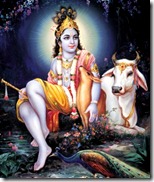 “Pure devotees, out of compassion for the fallen souls, are kripalu, very kind to people in general; they distribute this Bhagavata knowledge all over the world.” (Shrila Prabhupada, Shrimad Bhagavatam, 4.12.51 Purport) “Pure devotees, out of compassion for the fallen souls, are kripalu, very kind to people in general; they distribute this Bhagavata knowledge all over the world.” (Shrila Prabhupada, Shrimad Bhagavatam, 4.12.51 Purport)Two Sanskrit terms, seva and daya, very nicely complete the picture of behavior for human beings to follow. Seva means “service” and daya means “compassion” or “kindness”. But more important than knowing what the terms mean is understanding the position of the target beneficiaries. Service is meant to be offered to a superior entity, one who can show us the way and reveal the Truth in a manner that we can understand. Daya is applied to those who are suffering, the downtrodden that are in need of help. Thus compassion and kindness apply especially to inferior entities. But when seva is absent, or when the superior entity is not properly identified, the purity of daya suffers. On the other hand, when seva is directed towards the right person, that one entity who is always superior and forever worthy and capable of accepting service, the effectiveness of the compassion and kindness offered to the suffering only increases.  What are some examples of daya? The need for compassion and kindness towards the downtrodden is always discussed in society, especially in political circles. If ever a politician were to propose spending cuts to balance the budget or reduce inequities in the distribution of tax dollars, the opposition force’s best reply is to claim that the proposed move lacks compassion. “Without such and such money allocated to a particular project, people will be left destitute and without any source of food, clothing and shelter.” This line of argument works very well, because who would be against helping people that are in need? The average citizen has compassion for the poor and those who are in distressful situations, so anytime daya is attempted by a person of prominence, the action is well supported. What are some examples of daya? The need for compassion and kindness towards the downtrodden is always discussed in society, especially in political circles. If ever a politician were to propose spending cuts to balance the budget or reduce inequities in the distribution of tax dollars, the opposition force’s best reply is to claim that the proposed move lacks compassion. “Without such and such money allocated to a particular project, people will be left destitute and without any source of food, clothing and shelter.” This line of argument works very well, because who would be against helping people that are in need? The average citizen has compassion for the poor and those who are in distressful situations, so anytime daya is attempted by a person of prominence, the action is well supported.While daya is witnessed frequently, seva is not. Ironically enough, the penchant for service is built into the properties of the soul. The outer covering that we wear, which has accompanying characteristics, is not the basis for identity. We may take birth in a certain land and be labeled a certain type of citizen, but these circumstances could very easily have been altered. Higher forces, superior figures that we are dependent on, determined where we took birth and what type of parents we received. But we existed prior to birth, though in a different dwelling, or home. Just because the homes shift doesn’t mean that our identities get altered.
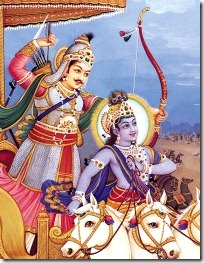 If I am not my body than who am I? The spirit soul, a tiny spark of energy that is so small that no blunt instrument can measure its size, residing within the heart of the living being represents their true self. If we can’t perceive the soul through microscopes and regular vision, how do we know it exists? Just as we see the invisible material element of the wind through its effect on visible objects, we can perceive of the soul’s presence by the autonomous functions of the living entity. The difference between a dull lump of matter and a living force is the presence of the spiritual spark within. When we see a seed turn into a giant plant or a tiny infant become a full grown adult, we can understand that the spiritual spark was responsible for the development. When a soul is inside of a particular body, we declare the being to be alive. Once the soul exits, once the autonomous functions and growth cycles cease, we deem the living being deceased. If I am not my body than who am I? The spirit soul, a tiny spark of energy that is so small that no blunt instrument can measure its size, residing within the heart of the living being represents their true self. If we can’t perceive the soul through microscopes and regular vision, how do we know it exists? Just as we see the invisible material element of the wind through its effect on visible objects, we can perceive of the soul’s presence by the autonomous functions of the living entity. The difference between a dull lump of matter and a living force is the presence of the spiritual spark within. When we see a seed turn into a giant plant or a tiny infant become a full grown adult, we can understand that the spiritual spark was responsible for the development. When a soul is inside of a particular body, we declare the being to be alive. Once the soul exits, once the autonomous functions and growth cycles cease, we deem the living being deceased.To get more detailed knowledge about the properties of the soul and where it comes from, we must accept information from authority. This shouldn’t be that difficult to do, as we put faith and trust into the words of others all the time. The nightly newscasts describe events happening around the world, but these stories easily could be fabricated. We go on the authority of the anchorperson that the events they are describing are indeed occurring. In a similar manner, we can accept information about the soul given to us by higher authority figures as valid. More important than just accepting the information is acting on it. When knowledge of the soul is put to good use, to attain a tangible benefit, the authenticity and glory of the authority source is validated. 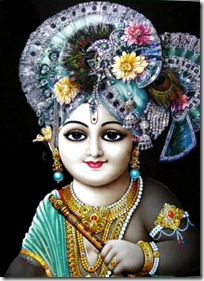 There is no higher authority source than the Vedas, the ancient scriptures of India. Meant to be understood by sincere beings of every persuasion, irrespective of their particular form of body, Vedic wisdom provides insight into the properties of the soul and how it is meant to behave. After all, when the soul is within a form, it takes to certain actions that are in line with the properties of the dwelling it occupies. When in an animal’s body the penchant is for eating, sleeping, mating and defending only. In the human life, however, not only can the presence of the soul be understood, but so can the glory and worthiness of service of its source. Not surprisingly, the Supreme Lord, or God, is the fountainhead of all energies, both material and spiritual. As we all come from God, we have a natural attachment to Him. When we are placed in a temporary dwelling, that love remains in a hidden state until extracted through knowledge and steady practice of religious principles. There is no higher authority source than the Vedas, the ancient scriptures of India. Meant to be understood by sincere beings of every persuasion, irrespective of their particular form of body, Vedic wisdom provides insight into the properties of the soul and how it is meant to behave. After all, when the soul is within a form, it takes to certain actions that are in line with the properties of the dwelling it occupies. When in an animal’s body the penchant is for eating, sleeping, mating and defending only. In the human life, however, not only can the presence of the soul be understood, but so can the glory and worthiness of service of its source. Not surprisingly, the Supreme Lord, or God, is the fountainhead of all energies, both material and spiritual. As we all come from God, we have a natural attachment to Him. When we are placed in a temporary dwelling, that love remains in a hidden state until extracted through knowledge and steady practice of religious principles.Though we may be forgetful of our love for God, the service propensity remains there just the same. If we are given a brand new laptop computer but don’t know how to type or how to even open it, we will obviously not put the device to good use. If we are given a brand new car to drive but don’t have a license or know of any places to go, we might use the vehicle for storage, a place to put our extra stuff. When we are in ignorance we cannot properly utilize the objects that we have. Similarly, when we remain in the dark about our relationship to God, we misuse the service ability by giving worldly objects highest priority. Instead of serving God, we surrender to cats, dogs, spouses, life partners, employers, friends, citizens, etc. Man will basically offer its love to anything and anyone except God. Is there a detriment to this aside from the failure to properly make use of the fully potent force of spiritual love found within the soul? There are actually many detriments to the misdirection of service. For starters, the soul continues to remain far away from its constitutional position. If there is no consciousness of the Supreme Lord and His blissful nature, another temporary dwelling will be granted the soul upon exit from its current body. This process is more commonly known as reincarnation, or the transmigration of the soul.
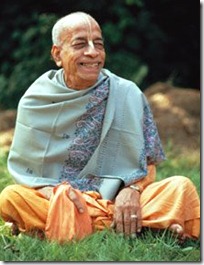 The other detriment is that the service itself becomes inferior. From the definition given of seva, we see that the service must be offered to a superior entity. But since every living being is equally a part and parcel of God, service to other people in the absence of God consciousness cannot constitute real seva. The living beings are Brahman, while God is Parabrahman. Moreover, when we adopt the service attitude based only on consciousness of the body, what we are actually serving is maya, or the illusory energy that governs the material world. Maya is that which is not personally God; hence the term applies to dull matter that is not used to further the purpose of becoming wholly God conscious. Without any knowledge of the soul and its relation to a higher power, seva equates to empty service. The other detriment is that the service itself becomes inferior. From the definition given of seva, we see that the service must be offered to a superior entity. But since every living being is equally a part and parcel of God, service to other people in the absence of God consciousness cannot constitute real seva. The living beings are Brahman, while God is Parabrahman. Moreover, when we adopt the service attitude based only on consciousness of the body, what we are actually serving is maya, or the illusory energy that governs the material world. Maya is that which is not personally God; hence the term applies to dull matter that is not used to further the purpose of becoming wholly God conscious. Without any knowledge of the soul and its relation to a higher power, seva equates to empty service.Another side effect is that the daya, or compassion, offered also becomes second class. Let’s say that we see someone who is downtrodden and in need of help. If we give them a few dollars to buy clothes and food, we have temporarily alleviated their distressful condition. A compassionate person always feels bad for those who are suffering. But once the temporary pains of hunger have subsided, has the aided person’s consciousness advanced? To use another example, we have compassion on our children for sure, as they are helpless and in need of constant guidance and attention. But if under the daya mentality tied to matter we provided everything for our children without giving them a proper education, have we really done anything worthwhile for them? The aim is to teach the children the proper knowledge that will allow them to grow up to be self-sufficient adults with a good moral standing. Hence the compassion we offer to the children, who are identified as inferior in stature, is meant to further a purpose, to reach an ultimate goal. All daya should follow this model; but unless there is real seva, the true benefits of compassion will never be seen. 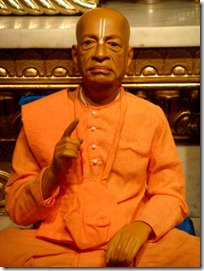 So how do we offer true seva? How do we love God if we don’t even know what He looks like or where He lives? This brings us back to the issue of authority and trust. Just as we put faith in our teachers to provide instruction in mathematics and science, if we kindly submit to a spiritual master, a guru who understands the truths of life as espoused by the Vedas and their celebrated texts like the Bhagavad-gita and Shrimad Bhagavatam, our doubts and concerns can be removed. On the surface the spiritual master seems to be an ordinary living entity just like the rest of us; hence the seva offered to him is really just service to maya, no? So how do we offer true seva? How do we love God if we don’t even know what He looks like or where He lives? This brings us back to the issue of authority and trust. Just as we put faith in our teachers to provide instruction in mathematics and science, if we kindly submit to a spiritual master, a guru who understands the truths of life as espoused by the Vedas and their celebrated texts like the Bhagavad-gita and Shrimad Bhagavatam, our doubts and concerns can be removed. On the surface the spiritual master seems to be an ordinary living entity just like the rest of us; hence the seva offered to him is really just service to maya, no?Since the spiritual master carries the message coming from the spiritual world, he is considered to be empowered, a figure who is to be treated as good as God. The bona fide spiritual master will never claim to be God. If he does, he lacks complete knowledge of the gradations of spirit. The spiritual master is Brahman realized, but that doesn’t mean that he has become Parabrahman. Rather, the guru is the greatest servitor of the Supreme Lord; his dedication to real seva is unmatched. Because of his benevolence, He instructs his disciples and others who kindly approach him how to perform the same service.  The spiritual masters of the Vedic tradition recommend that we today chant the holy names of the Lord, “Hare Krishna Hare Krishna, Krishna Krishna, Hare Hare, Hare Rama Hare Rama, Rama Rama, Hare Hare”, as often as possible to become spiritually enlightened. The misgivings we may have about God’s forms, pastimes, shapes, sizes, nature, kindness, anger, sectarian designations, etc. will be removed the more steadily we chant this sacred formula. The Vaishnava, or devotee of Vishnu [God], didn’t just come up with this chanting recommendation on a whim. Rather, it is authorized by the Supreme Lord Himself through the instructions He has provided to countless individuals throughout the course of history. The spiritual masters of the Vedic tradition recommend that we today chant the holy names of the Lord, “Hare Krishna Hare Krishna, Krishna Krishna, Hare Hare, Hare Rama Hare Rama, Rama Rama, Hare Hare”, as often as possible to become spiritually enlightened. The misgivings we may have about God’s forms, pastimes, shapes, sizes, nature, kindness, anger, sectarian designations, etc. will be removed the more steadily we chant this sacred formula. The Vaishnava, or devotee of Vishnu [God], didn’t just come up with this chanting recommendation on a whim. Rather, it is authorized by the Supreme Lord Himself through the instructions He has provided to countless individuals throughout the course of history.Chanting is the cornerstone of the discipline known as bhakti-yoga, or devotional service. This regulative system is only categorized as a form of yoga because it stands out from other engagements. In the constitutional position, the soul is fully immersed in bhakti, so it actually only has one engagement it is inclined to take up. When awareness of the soul’s direct link to God is forgotten, other systems of maintenance, or dharma, come into play. Below these systems are those concocted by man through his mental speculation. Since these “religious” practices are not authorized nor have they passed all the quality control tests already run by the exalted spiritual masters, they fail to deliver on their promises.  Through seva to the guru and other worshipable personalities like parents and elders, the human being gradually understands and realizes his constitutional position. When bhakti-yoga becomes a way of life, every second of the day is spent engaged in the service of the Lord. Sometimes the devotee is chanting the glories of Krishna, while at other times he is worshiping the deity manifestation, which is an empowered, carved statue or picture that accepts the kind obeisances of the humble soul. To offer service to someone personally, we have to interact with them, but since God is Absolute, He can hear our prayers and witness our prostrations before Him through the deity. Through seva to the guru and other worshipable personalities like parents and elders, the human being gradually understands and realizes his constitutional position. When bhakti-yoga becomes a way of life, every second of the day is spent engaged in the service of the Lord. Sometimes the devotee is chanting the glories of Krishna, while at other times he is worshiping the deity manifestation, which is an empowered, carved statue or picture that accepts the kind obeisances of the humble soul. To offer service to someone personally, we have to interact with them, but since God is Absolute, He can hear our prayers and witness our prostrations before Him through the deity.When there is real seva, daya automatically becomes fully potent. In fact, the instruction offered by the spiritual master is the most beneficial form of daya. The guru knows God and how to serve Him; he is self-realized. Armed with such powerful information, he could just sit idly by and not let anyone else in on the fun. But due to his compassion on the fallen souls, he kindly teaches others the same information he learned from his guru. Distributing transcendental knowledge on how to serve God represents true compassion, the offering of gifts to others that will really benefit them. When there is seva to Bhagavan, or the Supreme Personality of Godhead who is fully featured with the opulences of beauty, wealth, strength, fame, renunciation and wisdom, the compassion and kindness we offer our fellow man will be spiritually infused and thus lead them to the ultimate destination, that transcendental realm that is the natural home for the spirit soul. When in the Lord’s company, the distresses of the mundane world fly away |
Search This Blog
Wednesday, July 20, 2011
Service and Compassion
Subscribe to:
Post Comments (Atom)
No comments:
Post a Comment